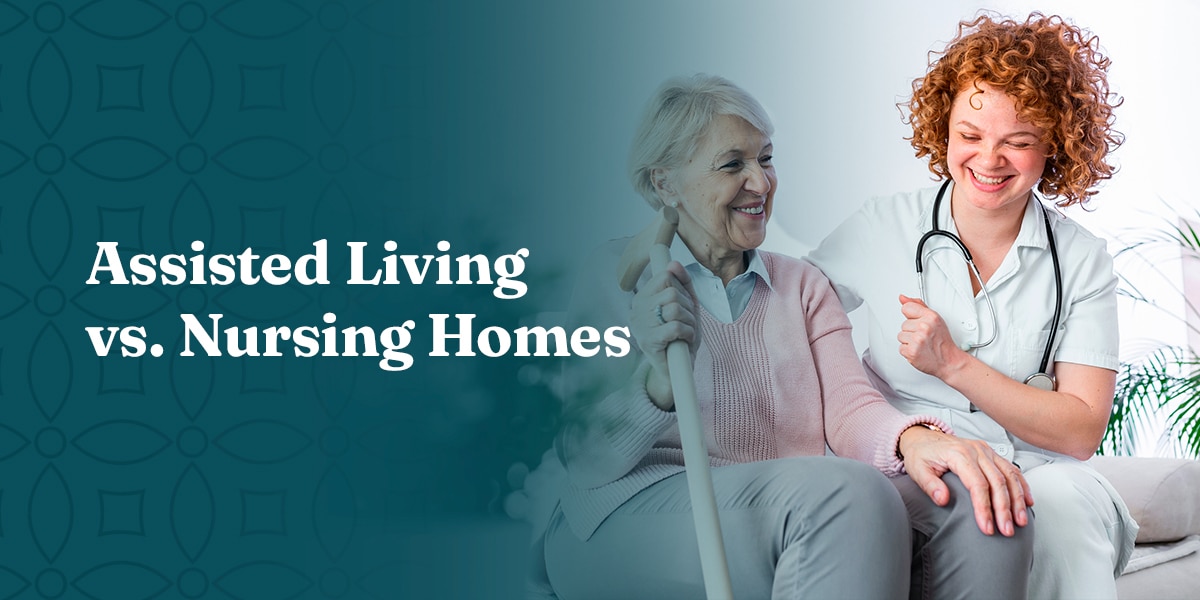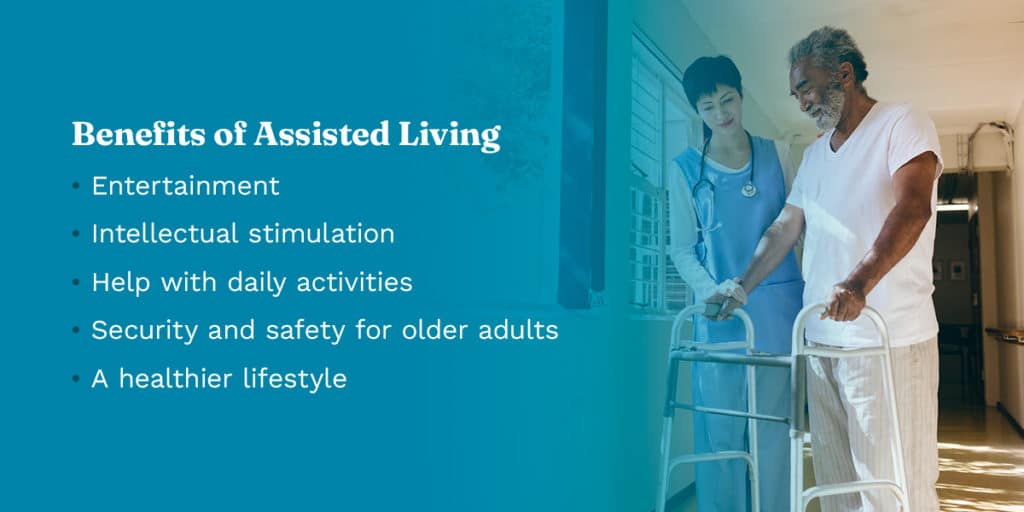Assisted Living vs. Nursing Homes

Compliance and Credentials Coordinator

If you have a family member who would benefit from socialization, assistance with day-to-day activities or direct access to nursing care, you might be considering a move and wondering about the differences between assisted living and nursing homes. The primary distinctions between these two options are the level of care provided and the cost. Generally, assisted living communities are for older adults who can no longer live on their own but do not need the daily nursing care provided in a nursing home. Nursing homes, also known as skilled nursing facilities, are for individuals who require a higher level of medical care and monitoring.
Another noteworthy difference is that assisted living communities offer residents a social, home-like setting, while nursing homes offer a clinical setting to accommodate frequent observation and manage complex medical care . Both types of residential alternatives have specific benefits — learning about these unique advantages can help you make the best choice for your relatives.
What Is Assisted Living?
Assisted living communities provide residents with an apartment-style living accommodation as well as other amenities and common areas. They help residents with activities of daily living, such as bathing, dressing and medication reminders and have nurses and aides on-site. Additionally, they offer different services such as housekeeping, meals, laundry and daily social activities.
These communities are state regulated and a licensed nurse is responsible for completing an individualized assessment for each resident to ensure they can provide the appropriate level of care. Ancillary staff is available throughout the day, including maintenance, housekeeping and dining staff members.
Health care professionals such as chiropractors, dentists and geriatricians will often make on-site visits. Some communities have even started offering occupational or physical therapy services supervised by licensed nurses, while others provide specialized memory care units for older adults with cognitive difficulties.
Like nursing homes, assisted living communities have emergency pull cords and other safety systems. Both residential alternatives offer laundry delivery services, light housekeeping and personal care.

Benefits of Assisted Living
A move to assisted living could help your aging relative enjoy health and happiness with the following advantages.
- Entertainment: Many assisted living communities offer entertainment and engagement via book clubs, poker and card tournaments, music and art classes, communal gardens and movie nights.
- Intellectual stimulation: Assisted living facilities provide lifelong learning opportunities. Older adults can stay engaged in an assisted living facility via brain games, guest lecturers and even personal tablets.
- Help with daily activities: One of the primary benefits of a move to assisted living is the availability of help with activities like bathing and getting dressed.
- Security and safety for older adults: Safety is undoubtedly your primary concern when seeking a new home for your loved one. Assisted living facilities provide security-related benefits such as on-call staff, disaster preparation and minimized fall risks.
- A healthier lifestyle: Older adults have unique nutrition and fitness needs. Many assisted living facilities boost members’ health with on-site exercise classes and dining services that provide flavorful, nutritious options.
What Is a Nursing Home?
Nursing homes, also known as skilled nursing facilities, offer a wide range of personal and health care services. These typically focus on medical care and include assistance with everyday activities, rehabilitation services, 24-hour supervision, nursing care and three meals a day. Individuals will go to a skilled nursing facility when their care needs are medically complex and require licensed healthcare professionals to manage and oversee their care. This type of care is often too complex for non-skilled communities such as assisted living facilities.
Nursing homes provide:
- Around the clock, 24/7 care
- Skilled nursing care and Personal care, including toilet assistance, bathing and dressing
- Physical, occupational, and speech therapy
- Intravenous therapy
- Wound care
- Recreational and social opportunities
- Administration and management of medication
- Room and board
Types of Senior Living
There are many different types of living options for older adults. Understanding the type of care provided and services offered to residents will help when making a decision. Below is an overview of some of the different types of senior living communities.
Independent Living Community or Retirement Community
These communities are ideal for older adults, typically 55 and above, who are able to live independently but want to have access to amenities, activities and services. Many offer various types of living arrangements, from houses to apartments. Independent living communities often have social gatherings, planned events, clubs, interest groups and maintenance services. Most independent living communities do not offer medical or nursing care, therefore if a resident requires assistance with care, they will need to coordinate these services privately. Other services include:
- Planned activities and events
- On-campus restaurants and cooking
- Home and lawn maintenance
- Housekeeping
Assisted Living Community
Assisted living communities offer personalized services and amenities to their residents with the added benefit of nursing assistance with their activities of daily living. They provide residents with more support and engagement than independent living communities. Assisted living communities allow older adults to continue to live an independent lifestyle while receiving care and support with activities such as bathing, grooming, medication management by nursing professionals.
Continuous Care Retirement Community
A continuous care retirement community may be an ideal option if you suspect your family member’s needs will change. They offer different housing options on one campus and provide different levels of care that support various stages of life. These campuses allow their residents to live in one location without having to move should their care needs change. These communities are commonly most expensive and typically have buy-in fees and monthly charges.
Skilled Nursing Facility
A skilled nursing facility is probably your best option if your relative needs complex skilled nursing care services such as wound care, ventilator care, tracheostomy care or intravenous medication administration and management. These facilities offer long-term care for medically necessary cases and are generally best for short-term stays. They provide access to a Medical Director, Delegating Nurses, Charge Nurses, Social Workers, Physical Therapists, Occupational Therapists, Speech Therapists and Certified Nursing Assistants. The type of care provided is skilled and these facilities are typically referred to as “nursing homes”.
Factors to Determine Which Option Is Right for Your Family Member
The following considerations will help you choose the best senior living housing option for your family member.
- Transportation services: What are the transportation options if non-emergency medical services are unavailable on the premises?
- Expense: How much does care cost? Does insurance cover any of the costs? How often does the community bill?
- Admission requirements: How long does the admissions process take, and what financial information will the community require during the admissions process?
- Meals: How do residents access their daily meals? Do they have different meal options? Can residents make their own meals?
- Employees: Does the community have nurses and caregivers on-site? Does the community allow for private caregivers?
- Resident care plans: How often does a licensed physician review and adjust customized care plans? All residents’ physicians must evaluate their needs and prescribe a medication program, diet restraints and therapy.
- Room sharing and furnishings: Look into the facility’s room-sharing policy. If your family member will have to share a bathroom or living space with other residents, will they have the power to change roommates if dissatisfied?
- Residents’ mental and emotional well-being: Intellectually stimulating social activities play a significant role in older adults’ mental and emotional health. A high-quality program should have regularly scheduled social events such as educational classes, bingo, exercise or a weekly musical event or movie.
- Staffing: The staff-to-patient ratio during each shift is essential.
- Physical consideration: What are the facility’s visiting hours, and how convenient is it to where you live? Location is crucial in determining how often family and friends visit patients.
- Physical consideration: What are the facility’s visiting hours, and how convenient is it to where you live? Location is crucial in determining how often family and friends visit patients.
Learn More About Corewood Care’s Senior In-Home Care Services
At Corewood Care, we understand older adults can experience the best caretaking services in the comfort of their own homes.
As life changes, so do people’s needs, and we strive to make a difference in our clients’ lives. Count on us for senior home care services such as personal care assistance, Alzheimer’s care, companionship care, home helper services, respite care, transportation services and day programs to keep older adults entertained with interactive activities.
Do you have questions about our senior home care services or need help determining if they’re appropriate for your family member? We invite you to reach out online to schedule your free care assessment today.




